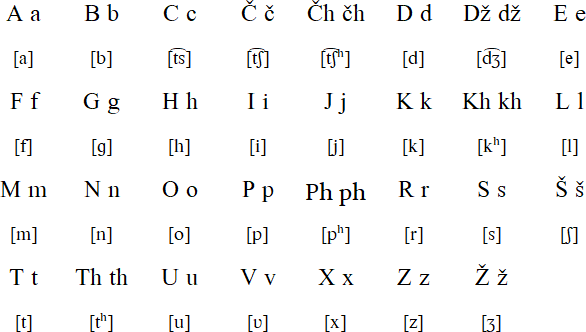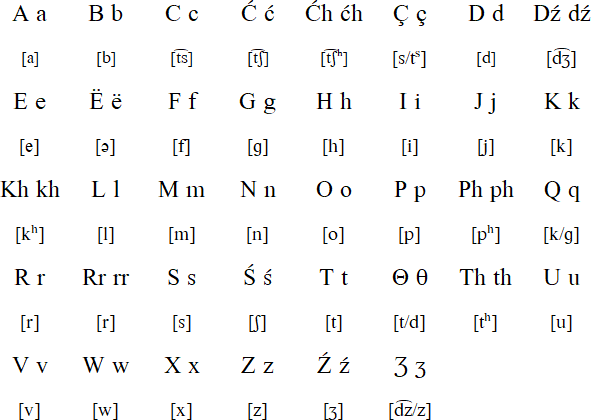Romani, or Romany, is an Indo-Aryan language spoken by about 5-6 million Roma people throughtout Europe and the USA. The largest concetrations of Roma people live in Turkey, Spain and Romania. In English these people are often called Gypsies. The language is closely related to the languages of northern India, particularly Punjabi, and the Roma are thought to have originally come from that region. Some people consider Romani to be a group of dialects while others think there are several, closely-related Romani languages.
The Muslim invasions of the northern part of the Indian subcontinent around 1000 AD resulted in massive movements of populations, probably including the ancestors of the Roma, who are thought to have moved into Anatolia. In 1300, after the Mongolian invasion of Europe, the Roma moved west into Europe and took up a mainly nomadic lifestyle.
Although Romani is used mainly as an oral language, some Roma do write in Romani. It is written mainly in the Latin alphabet, and also to some extent in the Greek, Cyrillic, Arabic and Devanagari alphabets. Romani was first written during the 16th century, when word lists were produced by non-Romani scholars such as Andrew Borde. Some orthographic conventions emerged over the centuries since then, but no completely standard spelling system.
This alphabet is used in literature about Romani languages written by linguists and represents a set of orthographical practices which exhibit a basic core of shared graphemes and a small amount of divergence in several areas.

This is the official standard alphabet for Romani. It was standardized in 1990 at the Fourth World Romani Congress in Serock, Poland. This alphabet can be used by all the Romani languages/dialects except Carpathian Romani and Finnish Romani.

There are other ways of writing Romani, such as:
http://romani.uni-graz.at/romlex/wsphonemic.xml
Download alphabet charts for Romani (Excel)
Sa e manušikane strukture bijandžona tromane thaj jekhutne ko digniteti thaj capipa. Von si baxtarde em barvale gndaja thaj godžaja thaj trubun jekh avereja te kherjakeren ko vodži pralipaja.
All human beings are born free and equal in dignity and rights. They
are endowed with reason and conscience and should act towards one another in a spirit of brotherhood.
(Article 1 of the Universal Declaration of Human Rights)
Information about Romani | Phrases | Numbers | Tower of Babel
Information about the Romani language and alphabet
https://en.wikipedia.org/wiki/Romani_language
https://en.wikipedia.org/wiki/Romani_alphabets
http://web.quipo.it/minola/romani/language9.htm
http://romani.humanities.manchester.ac.uk/
http://languagecontact.humanities.manchester.ac.uk/ELA/languages/Romani.html
http://romaniprojekt.uni-graz.at/
http://langsci-press.org/catalog/book/17
Online Romani lessons
http://www.romaninet.com/?sec=course
Online Romani phrases
https://www.youtube.com/watch?v=SyojvlmbzPM
https://uk.answers.yahoo.com/question/index?qid=20070311091110AAxqzcX
Online Romani dictionaries
http://www.freelang.net/online/romani.php
http://romani.humanities.manchester.ac.uk/angloromani/dictionary.html
https://glosbe.com/en/rom/
http://www.lowchensaustralia.com/names/romany-english-words.htm
http://gypsytravellerhistory.com/node/25
Caló, Domari, Erromintxela, Finnish Kalo, Kalderash, Lovari, Romani
Languages written with the Latin alphabet
Page last modified: 14.03.25
[top]
You can support this site by Buying Me A Coffee, and if you like what you see on this page, you can use the buttons below to share it with people you know.

If you like this site and find it useful, you can support it by making a donation via PayPal or Patreon, or by contributing in other ways. Omniglot is how I make my living.
Note: all links on this site to Amazon.com, Amazon.co.uk
and Amazon.fr
are affiliate links. This means I earn a commission if you click on any of them and buy something. So by clicking on these links you can help to support this site.
[top]